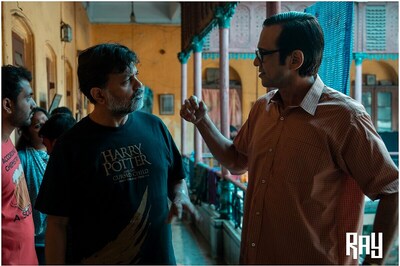
views
BANGALORE: Happiness Quotient — a mathematical term that can measure one’s happiness. Though her fifth book, The Happiness Quotient, Dr Rekha Shetty tells us how to achieve excellence in the corporate world and still be happy. The Indian culture and scriptures highlight that radiant happiness is our birth right, and this book illustrates how to attain that goal. Chennai-based Dr Rekha Shetty is the founder of the Mindspower brand and managing director of Farstar Distribution Network Ltd, a twenty-year old consulting firm working exclusively on innovation initiatives and work-life balance. At the launch of her book in Landmark, she enlightened Bangaloreans with her suggestions for grasping the concept of the happiness quotient.How would you describe happiness?The simplest sentence would be ‘a good night’s sleep every night.’ But let me tell you a little bit about my book. It’s a book that is not just to be read, but to be used. People should apply it like a tool. It might be possible for one person to be happy. But how do you apply it in a group? The book is about that. I’ve used a mathematical term like ‘Health Quotient’ in the title because it’s a mathematical tool used to measure and increase your happiness. And your primary target audience would be corporate professionals.I guess the book has captured the imagination of corporate professionals. But it can be used by anybody.Why is there a general notion that corporate professionals are a unhappy lot?Somebody once asked me why people should be happy. It’s a simple economic reason. A happy person can do things more productively. Usually, a company in the red is full of unhappy people. Happiness has a deep impact on the balance sheet of a company. That is why this is a workbook for corporate people.People describe ‘happiness’ as ‘a state of mind,’ and joy as something that goes beyond it — essentially, ‘spiritual peace’. What’s your take on it?I think everyone is looking for a sustainable state of happiness. That steady state of happiness is something that comes as the result of your decision, no matter what is thrown your way. People experience happiness and joy in moments in life. What we are talking about is sustained happiness. This happens when you have a proactive attitude towards happiness. It’s the decision that you make.Easier said that done?People’s natural state is to be happy. A child has it naturally. Human beings destroy it by the things they do. The mind is like a garden. If you fill it with rocks and scorpions, then it won’t be good. Instead you should plant flowers and fountains. You have to pour positive emotions into the garden of your mind.In the book, you explain things through a guru called Sadu Mama. Is he a figment of your imagination or did you meet someone like him?I don’t believe in one guru. I believe that life is the guru that provides us the many pieces of the jigsaw puzzle along the way. Sadu Mama is the essence of the consciousness — the essence of the many gurus who have given me information along the way.The book talks about life-force. What about a person who is not that spiritual? How will he/she connect with the book?I don’t talk about any particular religion in my book. I say that we have to take care of the seven areas in our life — physical wellness, emotional wellness, personal wellness, family bonding, nurturing the workplace, social bonding and dharmic living. It is good to be connected with some kind of power. Even atheists believe in some kind of power. For instance, how does a baby develop — there is a force behind it. The book is very rational.A recent survey pointed out Indian women are the most stressed out in the world. What is taking away their happiness?Women have to become a lot more empowered on the whole. They should stop being martyrs. I don’t think the family requires human sacrifice. If women don’t look after themselves, they will be tired, short-tempered and fall ill. Mothers should teach their daughters to love themselves. Then they will have the energy to balance work and home.



















Comments
0 comment